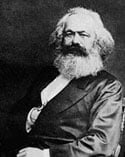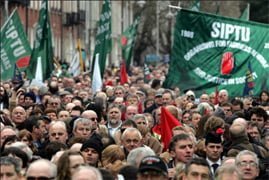The
bosses are trying to use the current economic crisis in Ireland to
reduce wages and living standards. That is not a secret, but they claim
that it is in the interest of the workers. The story goes like this;
Irish companies must become more competitive than companies in other
countries. In that way there will be more exports and more jobs will be
created. If workers don’t accept cutbacks jobs will be lost. To
challenge those ideas the labour movement need to return to Marx. It is
not enough to argue against cutbacks in capitalist terms. This article
proposes to start with the reading of “Wage Labour and Capital”.
(Click here to read the original work by Marx)
 Mary
Mary
Harney, Health Minister, has recently declared that the minimum wage in
Ireland will have to be cut in order to make the country more
competitive. Brian Lenihan, Minister for finance, has then added that
“if the minimum wage becomes an impediment to job creation the
Government has to look at it”. On the other hand, Peter Bacon,
government advisor for the setting up of NAMA, has recommended general
wage cuts of 10 to 15 percent on top of the cutbacks recommended in the
Bord Snip report. Social welfare cuts would be around 5 percent (Irish Independent, 21 July; Irish Times, 22 July).
The
logic underlining the bosses’ point of view is that only capital can
generate wealth and jobs, and on capital terms. So, both classes gain.
The bosses get their profits and the workers get their wages. But to do
that, they argue, both workers and bosses must defeat other competitors
by lowering wages and by bringing public sector workers down to the
level of private sector workers. Day in day out that message is
hammered into people’s heads. Union leaders argue that Irish wages are
already low compared to other EU countries and that bosses pay lower
taxes in Ireland. http://www.tgwu.org.uk/shared_asp_files/GFSR.asp?NodeID=94219
They also claim that EU economies with higher wages than Ireland are
also more competitive. They are not wrong. Capital-intensive industries
pay higher wages and are much more competitive than labour intensive
industries based on low wages. The problem is that Irish companies lag
behind in capital investment.
That
argument, however, doesn’t challenge the dominant ideas of the ruling
class. The labour movement needs to challenge the ideological
foundations on which the hegemony of capital is grounded. That means to
go back to Marx. There have been wide and far-reaching changes in
capitalism since the times of Marx but the inner logics of capitalism
remain the same. Constant change is part of the nature of capitalism. As Marx said in the Communist Manifesto:
Constant
revolutionising of production, uninterrupted disturbance of all social
conditions, everlasting uncertainty and agitation distinguish the
bourgeois epoch from all earlier ones. All fixed, fast-frozen
relations, with their train of ancient and venerable prejudices and
opinions, are swept away, all new-formed ones become antiquated before
they can ossify. All that is solid melts into air, all that is holy is
profaned, and man is at last compelled to face with sober senses his
real conditions of life, and his relations with his kind.http://www.unitetheunion.com/jol/PDF/The%20Truth%20About%20Irish%20Profits.pdf
Wage Labour and Capital
 In
In
his well-known essay, “Wage labour and capital”, Marx explains what
wages are and how they are determined, but he also explains at length
that the interest of capital and labour are antagonistic. Capital, Marx
argues, can only exist and expand through its constant exchange for
living labour power, since only labour can create value. Machinery just
represents dead labour power and can’t add any value to the commodities
it helps to produce. Workers, on the other hand, can only make a living
by hiring themselves to those who own the means of production. They
only have their labour power to offer. So Marx reasons like this:
Capital
therefore presupposes wage-labour; wage-labour presupposes capital.
They condition each other; each brings the other into existence… And
so, the bourgeoisie and its economists maintain that the interest of
the capitalist and of the labourer is the same. And in fact, so they
are! The worker perishes if capital does not keep him busy. Capital
perishes if it does not exploit labour-power, which, in order to
exploit, it must buy. The more quickly the capital destined for
production – the productive capital – increases, the more prosperous
industry is, the more the bourgeoisie enriches itself, the better
business gets, so many more workers does the capitalist need, so much
the dearer does the worker sell himself. The fastest possible growth of
productive capital is, therefore, the indispensable condition for a
tolerable life to the labourer.
That
argument exposes the grounds for reformism and class collaboration,
which Social Partnership represents in Ireland. The left, particularly
social democracy, bought into that idea long ago. During a period of
sustained economic growth that might work as it happened as the turn of
the 1900s, the period between 1945 and 1973, or in Ireland in the late
1990s. Wages then increase because capital grows rapidly and profits
increase faster than wages. That means that the gap between the workers
and the capitalists also increase. So, “class collaboration” benefits
capital, and in the way it does some more breadcrumbs are left for the
workers. As we have argued in Fightback, the wage share of national
income went down from 71.2 to 54 per cent between the periods 1980-1990
and 2001-2007. During those years there was a huge transfer of wealth
to the elite.[3] http://www.marxists.org/archive/marx/works/1848/communist-manifesto/ch01.htm So Marx argues,
Therefore,
although the pleasures of the labourer have increased, the social
gratification which they afford has fallen in comparison with the
increased pleasures of the capitalist, which are inaccessible to the
worker, in comparison with the stage of development of society in
general.
The
implications are that the more capital grows the more grows the power
of the capitalists in relation to the working class. Marx uses the term
relative wages to express that balance of power. Relative wages
“express the share of immediate labour in the value newly created by
it, in relation to the share of it which falls to accumulated labour,
to capital.” During a period of economic growth, as the years of the
Celtic Tiger, nominal wages (money price) and real wages (what nominal wages can buy) increased, but relative wages decreased.
Social inequality, therefore, has increased and “The power of the
capitalist class over the working class has grown, the social position
of the worker has become worse, has been forced down still another
degree below that of the capitalist.”
 According
According
to Marx, wages have nothing to do with the value that workers create
but with the price of the commodity “labour power”(capacity to work).
Wages are the market price of labour, which is determined by, “the
value of a definite quantity of the means of subsistence. It therefore
varies with the value of these means or with the quantity of labour
requisite for their production”.[5] But the concept of relative wages
allows him to regard both wages and profits as shares in the product of
the worker. Therefore, Marx concludes that the interest of Wage Labour
and Capital are “diametrically opposed”:
In
whatsoever proportion the capitalist class, whether of one country or
of the entire world-market, distribute the net revenue of production
among themselves, the total amount of this net revenue always consists
exclusively of the amount by which accumulated labour has been
increased from the proceeds of direct labour. This whole amount,
therefore, grows in the same proportion in which labour augments
capital – i.e., in the same proportion in which profit rises as
compared with wages… Finally, to say that “the most favourable
condition for wage-labour is the fastest possible growth of productive
capital”, is the same as to say: the quicker the working class
multiplies and augments the power inimical to it – the wealth of
another which lords over that class – the more favourable will be the
conditions under which it will be permitted to toil anew at the
multiplication of bourgeois wealth, at the enlargement of the power of
capital, content thus to forge for itself the golden chains by which
the bourgeoisie drags it in its train.
Competition and wages
But
the growth of capital also brings an increase in competition between
capitalists and crises of overproduction as we are witnessing now. Competition
between capitalists, on the other hand, increases competition between
workers and pushes wages down. It is worth quoting Marx here at some
length:
The
one capitalist can drive the other from the field and carry off his
capital only by selling more cheaply. In order to sell more cheaply
without ruining himself, he must produce more cheaply – i.e., increase
the productive forces of labour as much as possible… And so there
arises among the capitalists a universal rivalry for the increase of
the division of labour and of machinery and for their exploitation upon
the greatest possible scale… But the privilege of our capitalist is not
of long duration. Other competing capitalists introduce the same
machines, the same division of labour, and introduce them upon the same
or even upon a greater scale. And finally this introduction becomes so
universal that the price of [his commodity] is lowered not only below
its old, but even below its new cost of production…
As a result competition between workers increases with the introduction of machinery and the further division of labour:
The
greater division of labour enables one labourer to accomplish the work
of five, 10, or 20 labourers; it therefore increases competition among
the labourers fivefold, tenfold, or twentyfold. The labourers compete
not only by selling themselves one cheaper than the other, but also by
one doing the work of five, 10, or 20; and they are forced to compete
in this manner by the division of labour, which is introduced and
steadily improved by capital.
Furthermore,
to the same degree in which the division of labour increases, is the
labour simplified. The special skill of the labourer becomes worthless.
He becomes transformed into a simple monotonous force of production,
with neither physical nor mental elasticity. His work becomes
accessible to all; therefore competitors press upon him from all sides.
Moreover, it must be remembered that the more simple, the more easily
learned the work is, so much the less is its cost to production, the
expense of its acquisition, and so much the lower must the wages sink –
for, like the price of any other commodity, they are determined by the
cost of production. Therefore, in the same manner in which labour
becomes more unsatisfactory, more repulsive, do competition increase
and wages decrease.The
labourer seeks to maintain the total of his wages for a given time by
performing more labour, either by working a great number of hours, or
by accomplishing more in the same number of hours. Thus, urged on by
want, he himself multiplies the disastrous effects of division of
labour. The result is: the more he works, the less wages he receives.
And for this simple reason: the more he works, the more he competes
against his fellow workmen, the more he compels them to compete against
him, and to offer themselves on the same wretched conditions as he
does; so that, in the last analysis, he competes against himself as a
member of the working class.
 With
With
the introduction of machinery fewer workers can produce a higher
outcome. So, the number of the unemployed also grows and with it the
competition for jobs, making it easer for the bosses to lower wages. In
order to force workers to accept lower wages the bosses and the
government need to reduce social welfare. I started this article by
quoting attempts to reduce wages, including the minimum wage. The
cutbacks in social welfare recommended by the Bord Snip Report have an
easy logic. Government sources from the Tanaiste and Entreprise
Minister Mary Coughlan have warned that, “We wouldn’t like a situation
to arise where it is more attractive to be on social welfare than be
out working” (Irish Independent, 21 July). That is,
social welfare is another obstacle to capital accumulation, to the
freedom of the market to be removed. In the course of this struggle the
most reactionary newspapers such as the Irish Independent regularly contain anti-union articles, which they see as another obstacle.
The
interests of capital and labour as Marx argued are antagonistic. The
sooner the labour movement assumes that simple truth, and arms itself
with the ideas of Marxism, the better it will be prepared for the
battles that lie ahead. If capitalism cannot offer anything better than
cutbacks and increasing deterioration of living standards, even under
the most favourable conditions as Marx explains, then we must get rid
of it and start the socialist transformation of society. To start with
we must defend the old living standards and real wage levels by
stopping attacks on living standards as a way out to the present
crisis. We must make the rich pay for it by increasing our class power.
That means an increase in relative wages, which can only be achieved through class struggle. But no gain is permanent under capitalism. Socialism is the only way out.






